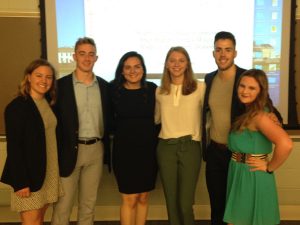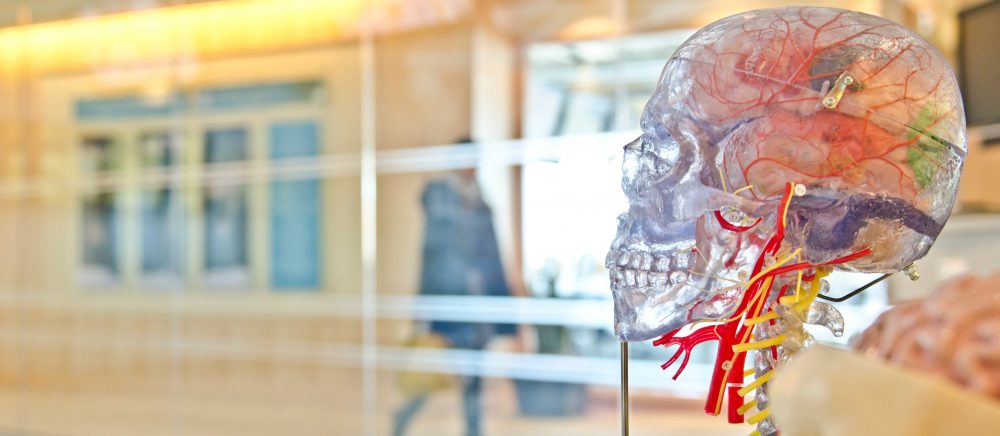
Class of 2019 Seniors at the Senior Research Symposium
2020-2021
Rachel Backstrom: Antidepressant Effects of Sleep Deprivation Chronotherapy in Male and Female Sprague-Dawley Rats.
Postgrad: PhD candidate in Neuroscience at University of Iowa
Grace Bouker: Mapping Out Learning: How Aerobic Exercise, Sex and Alzheimer’s Disease Impact Learning
Postgrad: Occupational Therapy at University of Puget Sound
Lexi Riley: The Impacts of Antioxidants and Environmental Enrichment on Memory and Learning in an Alzheimer’s Disease Rodent Model.
Postgrad: PhD candidate in Neuroscience at University of Florida
Katie Sarzosa: CBD Decreases Anxiety in ADHD-like Rat Model: Evidence for an Alternative Treatment Plan.
Sydney Schultz: Varying Levels of Impulsivity in an ADHD Rodent Model Influences Behavioral Accuracy.
Postgrad: Masters candidates in Medical Anthropology at Boise State University
2019-2020
Jenny Grossman: The Effect of the Antioxidant Supplement, Protandim, on a Mouse Model of Alzheimer’s Disease.
Postgrad: Research Technician Blue Ocean Barns
Alison Hsu: The Effects of Environmental Enrichment and Antioxidant Supplementation on Alzheimer’s Disease Rodent Model.
Postgrad: Masters candidate in the Computing and Digital media at DePaul University
Juyoung Ko: The Effects of Enrichment on Anxiety-like Behavior and Spatial Learning Memory in Relation to Restraint Stress.
Eleni Miliotou: The Effects of Melatonin on the Glymphatic System in an Alzheimer’s Disease Mice Model.
Postgrad: Research Technician UCLA Medical Center
Rebecca Warren: Spaced Training in the 5CSRTT Proves Beneficial in Early Levels.
2018-2019
Megan Battersby: The Effects of Noise Exposure on the Peripheral Vestibular System: An Investigation of Sex Differences and Threshold Shift Following Vestibular Damage.
Adam Chalek: Optimizing Intranasal Insulin Treatment During CPR Based on Delivery to the Brain, Mechanistic Target Engagement, and Neurologic Outcomes in a Rodent Model of Cardiac.
Postgrad: Medical School at Wayne State University.
Nicole Charles: The Effects of Enrichment and the Combination of Enrichment and Amphetamine on Hyperactivity in a Rodent Model of ADHD.
Michael Crookshanks: Rescuing Alzheimer’s Disease-Related Memory Impairment Through Nrf2 Activation.
Postgrad: Physician’s Assistant graduate student at Case Western University
Emma Fikse: The Effects of Environmental Enrichment on a Rodent Model of Alzheimer’s Disease and the Role of Senescence in Alzheimer Pathology
Postgrad: PhD candidate in Neuroscience at
Emma Lawrence: The invisible injury: Post-concussion syndrome symptoms on emotion processing following acute mental stress
Grace Minnes: Parental Stress, Parental Coping, and the Rating of Children’s Executive Functions: Is there a Relationship Between Coping and Executive Functioning?
Jordan Murray: The Impact of Antioxidant Supplementation on Affective Behavior and Cognitive Function in a Prenatally Stressed Rodent Model
Postgrad: Masters in Public Health, emphasis in epidemiology, at University of Toledo
Vanessa Ortega-Ramirez: Learning and Memory in Rodent Models of ADHD and Depression in the Morris Water Maze
Research Technician: Northwestern University
Maha Rashid: The Progression of AB Proteins in the Retrosplenial Cortex Using an APP/PS1 Alzheimer’s Disease Transgenic Rodent Model
Postgrad: PhD candidate in Neuroscience, Emory University
2017-2018
Leighton Albrecht. The Science of Forgetful Mothers: Determining the Long-Term of Parity on the Hippocampal Cholinergic System in Female Rats.
Postgrad: City Year
Elise Black: Hakuna Fermata: Music’s Anxiolytic Effect on Chronic Stress in Sprague Dawley Rats.
Jordan Kindinger: Go to Sleep: A Comparison Between Spontaneous-Hypertensive Rodents and Sprague-Dawley Rodents’ Performances in a Spontaneous Alternation Task after Short-Term Sleep Deprivation.
Postgrad: Masters in Clinical Mental Health Counseling at University of Akron
Erin O’Leary: Performance on the 5 Choice Serial Reaction Time Task Following Treatment with Frequency Specific Microcurrent in the Spontaneously Hypertensive Rat.
Postgrad: Neuroscience candidate in Neuroscience at the University of Illinois
Matea Paveskovic: Cellular and Molecular Mechanisms of Radiation-induced Neurocognitive Impairments.
Postgrad: PhD candidate in Neuroscience at the Baylor University
2016-2017
Noah Armstrong: The Role of PKA and Cyclic AMP During Sleep Deprivation in Drosophila Melanogaster.
Postgrad: Neuroscience candidate in Neuroscience at the University of Iowa
Dan (Fred) Coplin: Generational Effects of d-amphetamine on ADHD-like Behaviors.
Postgrad: MBA candidate in Pepperdine Business School
Natalie Coschigano: Examination of the Effects of High Level Zinc Exposure on Alzheimer’s Disease Related Memory in Mice.
Megan Mey: Impact of Hormone Replacement Therapy on Basal Forebrain Driven Tasks and Choline Acetyltransferase Expression in a Rodent Multiparous and Nulliparous Menopause Model.
Postgrad: Neuroscience candidate in Neuroscience at Florida State University
Katherine Wilson: The Effects of neonatal MK-801 on conditioned place preference of nicotine reward.
